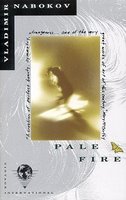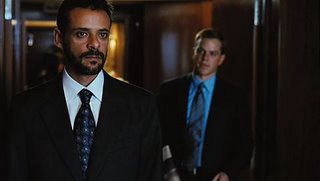 My first foray into the fiction of Vladimir Nabokov comes with Pale Fire. I've heard a lot about this guy. Both Lolita and Pale Fire have found their way onto quite a few lists of the best that English literature has to offer. I've heard about his style, his effortless command of language, his dizzying control of word-play, his mastermind use of vocabulary. I've heard nothing but good things about his writing. One thing I didn't count on, though, was his capacity to shit on his reader.
My first foray into the fiction of Vladimir Nabokov comes with Pale Fire. I've heard a lot about this guy. Both Lolita and Pale Fire have found their way onto quite a few lists of the best that English literature has to offer. I've heard about his style, his effortless command of language, his dizzying control of word-play, his mastermind use of vocabulary. I've heard nothing but good things about his writing. One thing I didn't count on, though, was his capacity to shit on his reader.
Pale Fire, to some, is a joyous romp, a delirious inside joke that is just so clever, how could one not be enthralled by it? It's basically a first-person commentary on a 999-line poem written by a fictional poet just before his untimely death. The narrator is obssessed with the life of this poet, and his massive commentary on the poem digresses back and forth between the narrator's fantasy (or is it?) world and his ultimate jealousy of the success of his poet friend. It's clear that Nabokov had something big in mind for this book, and the construction is so intricate, it's clear the guy definitely has the chops to be as praised as he is. The writing, for the most part, is lyrical and beautifully honed. The problem: the narrative is so aggressive, so clear that it's playing around with something (and what feels mostly like the reader), that I'm left in the cold. It's certain that some (most?) readers will be left in the dark, and I'd have a little less of a negative aftertaste if I didn't feel that the author was laughing at those who don't catch on. There are just too many subtle in-roads to get to the big inside joke.... they are there, but how much work am I expected to do? The layers are so deep that I don't even know where to begin.
This brings up an interesting question about storytelling in general. How much do you want your audience to work for the payoff? At what point do you alienate them, having made them work too hard? At what level can a story withhold information to tantalize yet entice the audience to remain invested? How does the audience know when the author/auteur is wanting them to solve the puzzle, and how do they know when the author/auteur turns their nose up at them?
It's interesting that my opinion of aggressive storytelling takes a different stance when it comes to movies. I tend to like the movies that take the non-traditional approach (three-act struture be damned!) to storytelling. I like picking apart the story to find how all the pieces connect, I like being able to do some of the leg work on my own. As far as successful examples of aggressive narrators in film, one can look to those written by Charlie Kaufman, the soon-to-be-annointed patron saint of screenwriting. I love the feeling of hard-fought realization when I solve the puzzle box of the story.... so when do I reach the point that I feel I've been messed with rather than encouraged? A recent example: Syriana (2005) uses an aggressive narrative, but only in how the story is delivered.... each scene is presented quite traditionally, actually, but how the scenes and storylines connect creates a massive webwork that definitely falls on the non-traditional side of storytelling. The trick is that you have to let the film wash over you as it unfolds; it's not designed to be picked apart scene by scene, but rather designed to complete a picture of the whole when it is all said and done. I think that this strategy worked very well for the film, particularly in the face of its scatterplotted story; it was the only way the story could be told. This isn't exactly the best example of a puzzle box movie, but it has similar facets.
A recent example: Syriana (2005) uses an aggressive narrative, but only in how the story is delivered.... each scene is presented quite traditionally, actually, but how the scenes and storylines connect creates a massive webwork that definitely falls on the non-traditional side of storytelling. The trick is that you have to let the film wash over you as it unfolds; it's not designed to be picked apart scene by scene, but rather designed to complete a picture of the whole when it is all said and done. I think that this strategy worked very well for the film, particularly in the face of its scatterplotted story; it was the only way the story could be told. This isn't exactly the best example of a puzzle box movie, but it has similar facets.
Pale Fire is much the same way, though.... while I was reading it, I was hoping for the wash-over effect to lead to the lightbulb going off in my head. Instead, I was left at a pitiful stage of brownout. My reading of it wasn't unenjoyable, exactly, but in the end there were just too many subtleties for me to try (and ultimately to want) to hone in on. I'm afraid that I fall in the camp of those who are not in love with Nabokov's writing, but maybe I should pick the book back up in a year and give it another go now that I know what it's trying to do. Maybe his other beloved works like Lolita and Pnin will prove me wrong?
We Can't Wait. 2026 Cinema. (Part Two: G-P)
6 hours ago

3 comments:
1. Suffice to say: You need to read Lolita. There are oodles of concertmasters in literature, but Nab is one of the few maestros.
2. I don't think there's an equation that explains the connection between narrative, payoff and reader participation. The possible interactions between author and reader are infinite. To use an example of a novel that requires extreme dogged pursuit, The Sound and the Fury is loathed, loved and everything'd in between. Faulkner inspires a rainbow of reaction (as does Nab, Kaufman, etc). So the question of value is not answered in the loving or the loathing, or the narrative's ease or opacity, but in the rainbow. The rainbow, man. You dig?
Oh, man. You're gonna hate my fiction...
Oh, dear god, I just realized that my last comment could be construed to be some self-comparison between Nabokov's work and my own. Completely unintentional and unforgivable. I simply meant that I often resort to whipping my readers' asses, as I love to have my ass whipped when I read.
Post a Comment